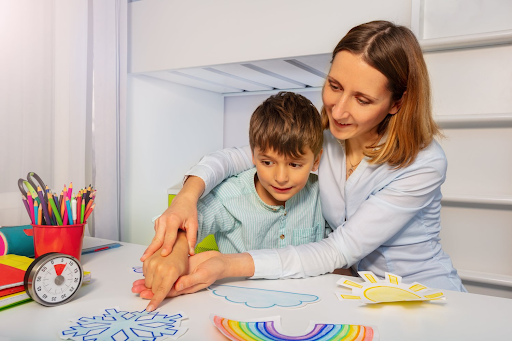Autism, also called Autism Spectrum Disorder (ASD), is a condition that affects how people understand the world and connect with others. People often feel difficulty in social interaction and communication as well as finding it difficult to switch between activities. The main causes of autism are still unknown but research and increased awareness help families and professionals to better understand how autism can look different across ages from childhood into adulthood. To better understand, let’s see the characteristics, symptoms, causes, diagnosis, and treatments of autism.
What is Autism Spectrum Disorder (ASD)?
Autism Meaning in Urdu can be described as “آٹزم” or “خوش خیالی ” and it refers to difficulties in social and communication skills development. The symptoms of Autism Spectrum Disorder are different in each person in terms of their type and severity. These symptoms generally affect social interaction, communication, and behavior. However, the range of symptoms and their intensity can differ from one person to another. ASD includes conditions such as Asperger’s syndrome, childhood disintegrative disorder, and pervasive developmental disorder not otherwise specified (PDD-NOS). Today, these terms are all grouped under the single term “autism spectrum disorder.”
Characteristics of Autism
Social Interaction Challenges
People with autism often find social cues challenging and also face difficulties in typical social interactions. They face these challenges in various ways such as avoiding eye contact, face difficulty understanding gestures, or reacting differently to others’ emotions.
Communication Difficulties
Both verbal and non-verbal communication can be affected due to autism. Some people including both children and adults with autism have a limited vocabulary or do not speak at all. In contrast, some others use language in unusual ways and speak in a flat tone or repeat phrases.
Repetitive Behaviors and Routines
Repetitive actions like hand-flapping, rocking, or strictly following routines are common in people with autism. Many people with autism find comfort in routines and when any unexpected changes occur in their routine then this situation can be stressful for them.
Sensory Sensitivities
Sensory processing difficulties can make people with autism extra sensitive or less sensitive to sensory experiences. For example, they can be very sensitive even to loud sounds or bright lights or there is also the possibility that they can not react to sensations like cold or pain in a typical way.
Symptoms of Autism in Children and Adults
Signs of Autism in Infants and Young Children
Delayed Milestones: Babies with autism can show their signs early like delayed speech or a lack of interest in social play such as peek-a-boo or copying others.
Limited Eye Contact: Young children also avoid eye contact or do not respond when their name is called, which can alert parents to possible developmental differences.
Unusual Play Patterns: Some children having autism play repetitively or they are extremely interested in particular toys or things and like to arrange them in particular ways.
Autism Symptoms in Adolescents
Difficulty with Peer Relationships: Teens with autism find it hard to make and keep friends because they find it difficult to understand social cues.
Special Interests: Many teens on the spectrum develop strong interests in topics like technology, animals, or music and they mostly enjoy discussing them.
Sensory Issues: They can be sensitive to textures, sounds, or lighting, which can impact their comfort and routines.
Autism in Adults
- Social Communication and Interaction: Adults with autism still find reading body language, understanding sarcasm, or making small talk difficult.
- Routine and Predictability: Many adults with autism prefer routines and feel stressed if their routine is changed.
- Employment and Independence Challenges: Social and communication difficulties can make certain jobs or independent living harder, though many grow with the right support.
What Causes Autism?
Research shows that a combination of genetic and environmental factors contributes to the development of autism. The main cause of Autism is genetic factors as it mostly runs in families and certain genetic changes can increase the chances of having autism. Some genetic conditions are linked to a higher risk. A child’s risk of having autism can also be increased by factors such as the parents’ older age, infection with certain chemicals, or pregnancy problems. Then the last one is environmental exposures like pesticides or air pollution are also being studied as possible influences on autism risk but more research is needed.
Treating and Managing Autism
Autism doesn’t have a specific treatment but different other treatments can be helpful for people to manage its symptoms and live their normal lives. Some common treatments include:
Behavioral Therapies
- Applied Behavior Analysis (ABA): ABA focuses on teaching specific skills like communication and social interaction through rewards to encourage positive behaviors.
- Speech and Occupational Therapy: Speech therapy helps with communication and occupational therapy supports skills like fine motor tasks and daily activities. For this purpose, patients can take the help of an online psychiatrist.
Medications
There’s no medication to treat autism itself but some medications can help manage related symptoms like anxiety, attention issues, or strong behavioral reactions.
Conclusion
Understanding autism means seeing both the challenges and unique strengths of people on the spectrum. As research improves and awareness increases, society is becoming more supportive and inclusive of those with autism. Whether diagnosed in childhood or adulthood, with the right support, people with autism can live meaningful and fulfilling lives.

